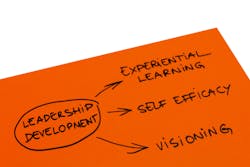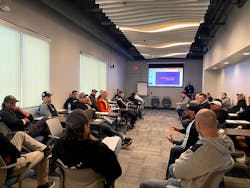The Harvard Business Review defines leadership as “an individual’s ability to influence, motivate and enable others to contribute toward organizational success. Influence and inspiration separate leaders from managers, not power and control. Leading by example and leading by enabling people are the hallmarks of action-based leadership.”
Increased productivity follows when you inspire employees and empower them to make the necessary decisions to do their jobs properly.
“Good leaders understand that there is a big difference between working hard and being more productive,” notes an Association for Talent Development blog (https://bit.ly/3kKtfrm). “Asking people to just work harder is the lazy leader’s way of trying to increase output. Instead, good leaders ensure that their teams have the right tools, resources and training to be effective. When leaders take this approach, they will find that their teams are more motivated.”
The search for future leaders within U.S. businesses is reaching critical mass as baby boomers continue to retire; many retirement plans have been accelerated as we still struggle with the COVID-19 pandemic.
The search for future leaders within U.S. businesses is reaching critical mass as baby boomers continue to retire; many retirement plans have been accelerated as we still struggle with the COVID-19 pandemic.
An estimated $166 billion is spent each year on leadership development, notes a 2019 Forbes article. These programs are “high-touch, in-person effort[s] [focusing] on soft skills (as opposed to certification training or skills-based instruction).”
“While experts might argue that the components of leadership are the same for all, leadership development doesn't work without a clear context and cultural understanding,” Forbes says. “Otherwise, the program is simply a curriculum: a course that assumes that every company in the world needs to begin at Chapter One. Leadership is often a personal journey, and it always starts where you are.”
In the construction industry, in-house grooming of young people to ascend to leadership positions is even more crucial. There is a dearth of new workers coming into the industry in all areas — management, engineering, logistics, skilled labor. Promoting from within also ensures the continuation of company culture.
We talked to four plumbing-heating-cooling-piping distribution firms to find out how they identify and guide potential leaders for future success — APR Supply Co. (Lebanon, Pa.), First Supply (Madison, Wis.), Porter Pipe and Supply (Addison, Ill.) and Torrco (Waterbury, Conn).
It Starts with Culture
Collaboration. Appreciation. Teamwork. Family-friendly. Purpose. Enthusiasm. Respect. Learning. Autonomy. Diversity. Trust. Dignity. Accountability.
These words are used to describe the cultures of our four wholesale distributors. These companies ensure their employees are satisfied in their careers by promoting education and professional development.
“At APR, you're allowed to think freely, have your own opinion and learn from your mistakes without being crucified,” says Matthew Novello, APR Supply’s Central Region HVAC product manager. “It's a culture of learning, bettering yourself, taking chances, and being the best teammate that you can be with your fellow workers.”
Derek Peiffer, who manages APR’s Lancaster, Pa., location, adds: “Our goal is to create enthusiastic teammates and enthusiastic customers. So externally, we're very customer-focused. The culture allows us to take chances and build experiences to help our colleagues and customers succeed.”
Porter Pipe & Supply emphasizes the family nature of its culture, ensuring that employees feel appreciated in their respective roles.
Addressing the labor shortage head-on, First Supply incorporates diversity in its culture.
“One of the first things we look for when we're interviewing for new team members is culture fit,” explains Andrew Peck, Porter Pipe’s learning and development manager. “Culture for us is about keeping our team — or our customers, vendors or community — connected, having fun in what we do, keeping that family atmosphere and always putting each other first. We've strived very hard to make sure our team enjoys being here and knows that they're appreciated.”
Addressing the labor shortage head-on, First Supply incorporates diversity in its culture.
“In the past several years, the company culture and focus has shifted to increasing diversity of all types,” notes Deb Ethington, First Supply’s senior manager of HR and training. “Hiring and developing a younger, diverse workforce in preparation for successful technical knowledge transfer is essential as a large segment of the aging workforce transitions from full to part-time and into retirement.”
Isabel Montoya, Torrco’s HR manager, adds: “As a family-owned business, we strive to provide a welcoming and collaborative place to work, where employees feel they are not only given the resources to do their best work but are also treated with dignity and respect. We instill a culture of teamwork, trust, accountability and passion for what we do in our employees, which in turn influences the customers.”
Developing Leaders from Within
Leadership philosophy is value-based; it is tied to a company’s culture, which is based on the business's core values. A respectful culture demands that its leaders treat employees fairly and with empathy when mapping out productivity and other business goals.
“Diversity is limited in much of this business segment, so First Supply has committed to growing diverse leaders from within,” Ethington says.
The distributor accomplishes this through its 12-month rotational training program, she notes. The first five months are spent working in, and learning, all aspects of the warehouse at the distribution center. Trainees then spend two months working in the kitchen, bath and lighting segment of the business.
The final five months are spent working in customer service, typically focusing on one aspect of the distribution business — plumbing, HVAC, or pipe, valves and fittings. Time also may be spent working in purchasing, pricing, HR, IT and on special projects. Since 2019, First Supply’s program has had eight graduates; there are five employees in the program this year.
Promoting from within ensures the continuation of company culture.
“The goal is to place graduates into all aspects of the business with a heavier emphasis on operations,” Ethington explains. “We try to have two rotational trainees at the designated locations. Each has a guide, who answers day-to-day questions, and a mentor, who helps trainees understand the company and its career paths.”
The next step in developing First Supply business leaders is to continue creating more robust succession and development plans, she says, including the American Supply Association’s (ASA) leadership development courses and the Distribution Leadership Certificate, in conjunction with Purdue University.
APR Supply began its Junior Executives Group in 2006 mainly as a social and networking group to “build relationships and encourage success amongst some of the younger generation coming to APR and into this industry,” Novello says. Today, APR’s Leadership Development Trainees group, helmed by Novello as president and Peiffer as vice president, has 29 members currently.
Each year, the leadership trainees come up with one big-picture project for APR Supply that they can work on together, headed up by a project lead. The group breaks into teams and sets timelines and goals for the project.
Peiffer adds: “As the younger guys grew and gained some experience, they were able to take the new crew of young leaders coming in and share experiences, become mentors and help everyone grow together. I've experienced it, Matt's experienced it and I think it's really good for APR.”
Each year, the leadership trainees come up with one big-picture project for APR Supply that they can work on together, headed up by a project lead. The group breaks into teams and sets timelines and goals for the project. The project lead is responsible for organization, scheduling meetings and making sure that the timelines are met. At the end of the year, they present these to the senior leadership team.
Previous projects have been selling dead and damaged stock, and putting together an inside sales counter guide. The young leaders also work on a charity project once a year; this year, they work with the Homes for Our Troops organization.
“They help our team members take the initiative, take leadership by the horns,” Peiffer says. “It teaches them goal-setting and accountability.”
Torrco’s leadership development program is 'multifaceted,' Montoya notes: 'We believe each employee is unique.'
Torrco’s leadership development program is “multifaceted,” Montoya notes: “We believe each employee is unique. Therefore, we’re constantly looking for employees who show potential (and interest) to become great leaders. We help them develop themselves through the use of several methods, resources and training.”
Its Emerging Leaders program helps the distributor identify a group of “high-potential,” younger employees. Torrco invites them to participate in a year-long curriculum using a 70/20/10 model (70 percent on-the-job learning, 20 percent informal and 10 percent). COVID-19 forced the distributor to put a hold on the program; there is one manager trainee this year.
“Aside from this program, we use several other methods depending on the employee’s position and background (i.e., tenure, learning style),” she explains. “Those include in-person training such as vendor meetings and manufacture training, to e-learning modules that range from interpersonal skills to technical skills to product knowledge.”
The Porter Educational Assessment Center launched back in January. The distributor built a whole new training space with Zoom-capable meeting space, computer setups for e-learning, etc. About 40 Porter managers are working through the leadership development program.”
“We've invested in developing our future leaders,” Peck notes. “The company has grown significantly over the years; the number of team members has at least tripled since I joined the company back in 2006. So with that kind of growth in that kind of timeline, developing leaders has certainly become a priority. We have many middle- and upper-level management spots where we hadn't groomed anyone for them.”
We wrap up with some advice from Novello to his counterparts in construction who may be considered a leadership position in their companies:
• “Be hungry and eager to learn, even if it's outside of your department. Having a general understanding of how this business works will help you as you move through your career. Take every training opportunity possible.
• “Don’t be afraid of being vulnerable. Learn from your mistakes and learn from the people around you who have more experience. Don’t dwell on mistakes; learn and move on.
• “Consistently work on improving your Emotional Quotient. Have an awareness of the people around you and how well you work with a team.”
Kelly Faloon is a contributing writer to Contracting Business magazine and principal of Faloon Editorial Services. The former editor of Plumbing & Mechanical magazine, she has more than 20 years of experience in the plumbing and heating industry and B2B publishing. Faloon is a journalism graduate of Michigan State University.
About the Author

Kelly L. Faloon
Freelance Writer/Editor
Kelly L. Faloon is a contributing editor and writer to Contracting Business magazine, Contractor and HPAC Engineering. The former editor of Plumbing & Mechanical magazine, Faloon has more than 20 years experience in the plumbing and heating industry. She started a freelance writing and editing business in 2017, where she has a varied clientele.
Faloon spent 3 1/2 years at Supply House Times before joining the Plumbing & Mechanical staff in 2001. Previously, she spent nearly 10 years at CCH/Wolters Kluwer, a publishing firm specializing in business and tax law, where she wore many hats — proofreader, writer/editor for a daily tax publication, and Internal Revenue Code editor.
A native of Michigan’s northern Lower Peninsula, Faloon is a journalism graduate of Michigan State University. You can reach her at [email protected].

